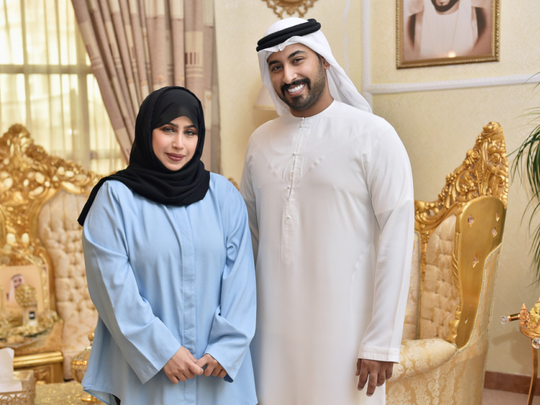
Abu Dhabi: As far as sibling bonds go, the one Ali and Anfal share is far stronger than most. Hearing that her brother’s kidney function was dangerously low, Anfal Al Bahar donated her kidney to him in a transplant surgery last year.
Speaking to Gulf News, the 29-year-old Emirati donor says that every resident who is able and healthy must consider becoming an organ donor.
“The smile on my brother’s face after the procedure is one I can never forget. And it just brought home to me the fact that there are so many people out there in dire need of organs,” said Anfal, a customer service executive and mother-of-one.
“I am grateful that I was able to become a donor for my brother. But there must be so many people who don’t find perfect donor matches within their family. This is why it is so important for everyone to have the conversation with their family, and express interest in becoming organ donors if the chance ever arises,” she added.
Ali Al Bahar, a 28-year-old engineering graduate, was first diagnosed with systemic lupus erythematosus, an autoimmune disease in which the immune system attacks healthy tissue. Over time, one of his kidneys failed, but Ali was able to maintain the remaining kidney function with medication, and by drinking significant amounts of water.
In summer 2017 however, his kidney function dropped to just 20 per cent, and doctors told him it was either time to consider a transplant or give in to years of dialysis.
Among his four siblings and parents, only Anfal was found to be a suitable match.
“My sister is my hero. Even at the last moment before the surgery, I told her she could opt out. But she didn’t even stop to consider it,” Ali remembered.
The siblings underwent the transplantation procedure in December 2017 at the Shaikh Khalifa Medical City, a government-run health care facility in the capital. Prior to it, Ali quit smoking, and Anfal shed 10kg of weight under doctors’ recommendations. Afterwards, Ali was kept under observation for about 45 days before being discharged.
Since then, Ali says his life has transformed completely.
“I was often fatigued, and would become dizzy from exertion. Climbing the stairs was hard work, and I could only run 200 metres before getting tired. Now, I can run a kilometre with complete ease. And I know fully well that my sister’s act saved my life,” Ali said.
For her part, Anfal says she didn’t have any second thoughts.
“Only my father and I were potential kidney donors in our family, and I prayed that I would prove to be the perfect match because I didn’t want my father to have to deal with a surgery at his age. After the procedure, I was hospitalised for only five days, and was up and about in 15 days,” Anfal said.
The UAE has long allowed organ donations between living family members, and this has been the primary means by which patients in need of transplants have received organs. Since March 2017, it has also paved the way for organ donations from deceased donors. Until a nationwide donor registry is formally established, residents who wish to become donors can inform family members about their wishes.
“Because of my autoimmune condition, I myself can never become an organ or even blood donor. But it is such a noble act that I only wish I were able to donate to patients in need,” Ali said.
Discrimination towards organ recipients
As the UAE prepares to establish a nationwide organ donor registry, Ali Al Bahar, an Emirati organ recipient, has said there needs to be greater acceptance of people like him.
According to the 28-year-old engineering graduate, employers seem wary of hiring him when they learn that he has had a kidney transplant.
“I have attended a number of interviews that have gone very well, and have even progressed beyond the initial stage. But when I mention that I have received a kidney transplant, I don’t hear back from the companies, even though I dare say I am well suited for the role,” Al Bahar alleged.
“Organ transplantation is set to become more and more common in the UAE as the country sets up a donor registry. In face of this, we need society to develop a greater understanding of the procedure, and acceptance towards recipients. After all, I am now a fully functioning individual,” he said.












